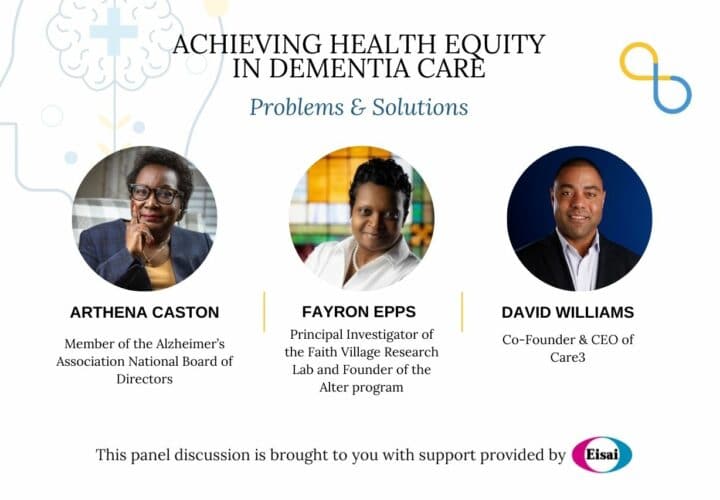Aduhelm's clinical trials shines a light on why representation is crucial in the search for effective Alzheimer's treatments.
UPDATE: 3 March 2024, 8:35 P.M. ET. In February 2024, Biogen took Aduhelm off the market, citing financial concerns. Although the drug did receive accelerated, conditional FDA approval for the treatment of early Alzheimer’s disease in 2021, it is no longer available to new patients. The company announced it would sunset trials in May 2024 and cease supplying the drug to current patients in November 2024.
The Food and Drug Administration’s (FDA) approval of Aduhelm, the new Alzheimer’s drug, sparked a firestorm of controversy in the Alzheimer’s community. Some experts believe that the decision paves the way for a new era of Alzheimer’s treatments. Others say that the move was premature, given the lack of data regarding the anti-amyloid therapy’s efficacy. But scientists have also pointed to another problem in the drug’s clinical trials: the lack of diversity among trial participants.
Without adequate racial diversity in Aduhelm’s clinical trials, Lisa Barnes, a cognitive neuropsychologist, said the drug’s effects in minority populations remain unclear.
“Number one, you can’t assess [the] effectiveness of [the] drug in that population,” Barnes, a professor of gerontology and geriatric medicine at Rush University Medical Center, told Being Patient about Aduhelm’s efficacy for Black patients with Alzheimer’s. “You definitely can’t assess safety, and there are side effects that might be more prevalent in diverse populations.”
Of late, there has been a broad call to action for more diversity in clinical trials, and Barnes said Aduhelm’s approval offers a timely example of why representation in Alzheimer’s research matters so much. Without study participant pools that resemble the actual population of people living with Alzheimer’s, she wrote in a recent paper for Nature that scientists will never reach a complete understanding of the racial disparities in the disease; this makes it impossible to develop treatments that work for everyone.
In the case of Aduhelm, a Phase 4 observational study of the drug now aims to examine Aduhelm’s effects in 6,000 patients, with at least 16 percent African Americans and Hispanics. This is an improvement over the drug’s Phase 3 trials, but even still, it doesn’t necessarily reflect the reality that older Black Americans are estimated to be anywhere from from 14 percent to almost 100 percent more likely to have Alzheimer’s or other forms of dementia as their white counterparts.
But, because of this dearth of racial representation in research, whether this disparity truly holds up — and if so, to what extent — remains a question mark. “Inconsistencies in the existing data and an important lack of data where it is most needed mean that we cannot be confident that the evidence supports this claim,” Barnes wrote. “Until and unless we change the narrative by increasing the number of studies that include African American participants, integrating risk factors that reflect the lived experience, and acquiring the biological data that will allow us to comprehensively examine the underlying mechanisms of disease, we will continue to have an incomplete understanding of racial differences in [Alzheimer’s].”
Genetics and environment both play important roles, but beyond this, many questions remain unanswered. In the case of biological factors, researchers are learning more about key biomarkers for dementia, like beta-amyloid, tau, Lewy bodies and cerebrovascular disease. One or multiple of these pathways could lead to new treatments for Alzheimer’s. However, Barnes wrote, few studies have investigated these pathologies in Black Americans. Again, so far, the data gathered from post-mortem and biomarker studies has been mostly from white study participants.
“We need more diversity in studies,” Barnes said. “We need people to volunteer, to take part in studies so that we can find a cure that will work for everyone.”
But, Barnes wrote said, there isn’t a simple solution: Ultimately, recruiting people from underrepresented communities for research requires education, trust and mutually beneficial relationships between participants and researchers. This process takes time, effort and resources. But addressing minorities’ unequal access to health care and mistrust in biomedical research is key to increasing representation, she noted.
“If you think hanging a flier in your clinic is going to get people to sign up for your study, you’re wrong,” Barnes said. “Number one: Diverse populations are not as connected to health care. Number two: They have been abused a lot by the medical field and researchers. We have to be able to show them that we are trustworthy, that we will do right by them and that we’re not out to hurt them. We’re out to only help them. But it’s a process. We can’t expect them to come to us in the ivory towers of our research clinics or our medical universities. We have to go to them in their communities, raise awareness about this disease and help them understand why their participation is important and necessary.”




